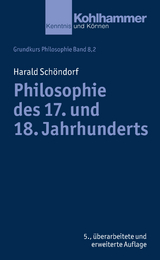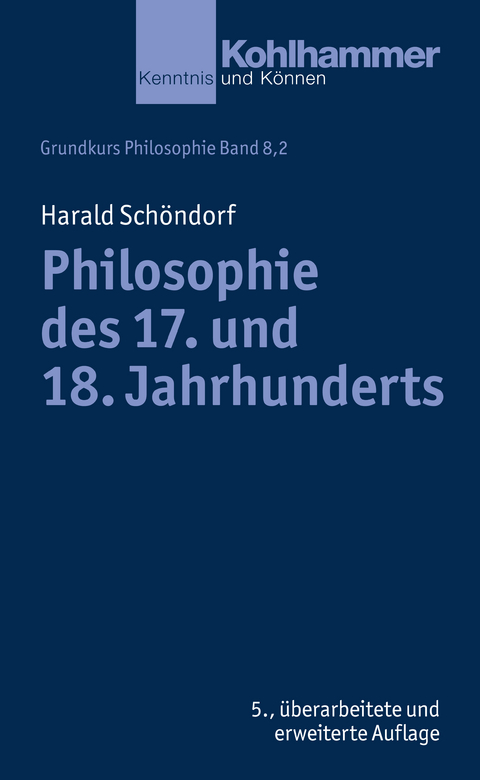Philosophie des 17. und 18. Jahrhunderts
Seiten
2016
|
5., überarbeitete und erweiterte Auflage
Kohlhammer (Verlag)
978-3-17-026392-5 (ISBN)

Kohlhammer (Verlag)
978-3-17-026392-5 (ISBN)
Lese- und Medienproben

Die Philosophie des 17. und 18. Jahrhunderts bildet die Grundlage des gesamten neuzeitlichen Denkens. Sie beginnt mit einer Prüfung des Wahrheitsgehalts unserer Bewusstseinsinhalte, um auf dieser Basis das System unserer Erkenntnisse zu entfalten. Unter dieser Norm stehen der Rationalismus von Descartes und Spinoza, Leibniz und Wolff ebenso wie der Empirismus seit Bacon und Hobbes bis Locke, Berkeley und Hume. Beide Denkrichtungen verbinden sich in der Aufklärung. Vor allem Kant vollendet und überwindet durch seine Vernunftkritik diese Periode.
The philosophy of the 17th and 18th Century forms the basis of all modern thinking. It starts with an examination of the substance of our consciousness in order to unfold the system of our insights on this basis. The rationalism of Descartes and Spinoza, Leibniz and Wolff, as well as empiricism from Bacon and Hobbes to Locke, Berkeley and Hume, belong under this category. Both mindsets are combined in the Enlightenment. Kant, above all, completes and transcends this period with his criticism of reason.
The philosophy of the 17th and 18th Century forms the basis of all modern thinking. It starts with an examination of the substance of our consciousness in order to unfold the system of our insights on this basis. The rationalism of Descartes and Spinoza, Leibniz and Wolff, as well as empiricism from Bacon and Hobbes to Locke, Berkeley and Hume, belong under this category. Both mindsets are combined in the Enlightenment. Kant, above all, completes and transcends this period with his criticism of reason.
Dr. Harald Schöndorf SJ ist emeritierter Professor für Erkenntnislehre und Geschichte der Philosophie mit Schwerpunkt Philosophie der Neuzeit an der Hochschule für Philosophie München.
Dr. Harald Schöndorf is Professor Emeritus of Epistemology and History of Philosophy with a focus on the philosophy of Modern History at the University of Philosophy in Munich.
| Erscheint lt. Verlag | 30.5.2016 |
|---|---|
| Reihe/Serie | Grundkurs Philosophie ; 8,2 | Kohlhammer Kenntnis und Können |
| Verlagsort | Stuttgart |
| Sprache | deutsch |
| Original-Titel | Philosophy of the 17th and 18th Century |
| Maße | 120 x 195 mm |
| Gewicht | 364 g |
| Themenwelt | Geisteswissenschaften ► Philosophie ► Geschichte der Philosophie |
| Geisteswissenschaften ► Philosophie ► Philosophie der Neuzeit | |
| Schlagworte | 17. Jahrhundert; Geistes-/Kultur-Geschichte • 18. Jahrhundert; Geistes-/Kultur-Geschichte • Aufklärung • Aufklärung (Zeitalter) • Empirismus • Hobbes • Immanuel Kant • Jahrhundert, 17. /Philosophie • Jahrhundert, 18. /Philosophie • John Locke • Kant, Immanuel • Philosophie • Philosophiegeschichte • Rationalismus • Spinoza • Theologie • Thomas Hobbes • Vernunftkritik |
| ISBN-10 | 3-17-026392-7 / 3170263927 |
| ISBN-13 | 978-3-17-026392-5 / 9783170263925 |
| Zustand | Neuware |
| Haben Sie eine Frage zum Produkt? |
Mehr entdecken
aus dem Bereich
aus dem Bereich
die kolonialen Wurzeln der französischen Theorie
Buch | Hardcover (2024)
Matthes & Seitz Berlin (Verlag)
CHF 41,90
eine Geschichte der Zuversicht von Homer bis zum Klimawandel
Buch | Hardcover (2024)
C.H.Beck (Verlag)
CHF 39,20



